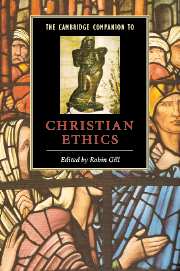Book contents
- Frontmatter
- Part I The grounds of Christian ethics
- Part II Approaches to Christian ethics
- 6 Natural law and Christian ethics
- 7 Virtue ethics
- 8 Gender and Christian ethics
- 9 Liberation ethics
- 10 Christian ethics
- 11 Other faiths and Christian ethics
- Part III Issues in Christian ethics
- Select bibliography
- Index
9 - Liberation ethics
from Part II - Approaches to Christian ethics
Published online by Cambridge University Press: 28 May 2006
- Frontmatter
- Part I The grounds of Christian ethics
- Part II Approaches to Christian ethics
- 6 Natural law and Christian ethics
- 7 Virtue ethics
- 8 Gender and Christian ethics
- 9 Liberation ethics
- 10 Christian ethics
- 11 Other faiths and Christian ethics
- Part III Issues in Christian ethics
- Select bibliography
- Index
Summary
Whilst it would be an overstatement to say that there are as many liberation theologies as there are practitioners, it is certainly true that liberation theology is not all of a piece. This is not just to point to the varieties of liberation theology - black, Asian, African, Jewish, feminist, womanist and so forth (and since feminist ethics are treated elsewhere in this volume, I will not deal with the subject here) - but to the variety of standpoints even within Latin America, where the movement started. Juan Luis Segundo, for example, had an essentially evolutionary understanding of reality which he shared with his fellow-Jesuit Teilhard de Chardin. He can cite with approval the view that every vice was probably at some time a virtue, and that what we call 'human beings' are only slowly emerging from the tangle of primitive drives and instincts. He frankly avows a situation ethic, an ethic in which the ends justify the means, but on the understanding that Christian ends are the most communitarian and generous-hearted imaginable. Míguez Bonino, on the other hand, offers us a survey of twentieth-century social ethics, but allows himself to formulate a principle which is virtually identical with utilitarianism: 'The basic ethical criterion is the maximising of universal human possibilities and the minimizing of human costs.'
- Type
- Chapter
- Information
- The Cambridge Companion to Christian Ethics , pp. 125 - 137Publisher: Cambridge University PressPrint publication year: 2000

